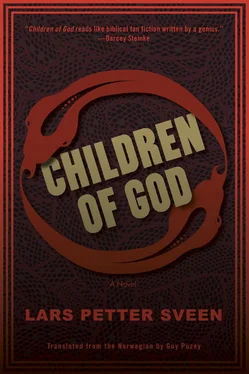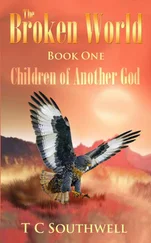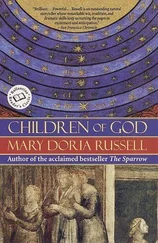Lars Petter Sveen
CHILDREN OF GOD
And there are also many other things which Jesus did, the which, if they should be written every one, I suppose that even the world itself could not contain the books that should be written. Amen.
John 21:25
1  LITTLE CHILDREN
LITTLE CHILDREN
It was in the days of Herod the Great, in Bethlehem, and we were on the lookout for a little king of the Jews who’d been born. The stars were out, and we’d come to kill him.
Tuscus barged through the door ahead of Cato, who took the lead, sword in hand, while I followed. Celsus stayed outside. An old married couple were kneeling in the small room. A weak oil lamp cast a flicker of light on the pair. Cato pointed his sword at them. He was in charge; he was our officer. He opened his mouth, but instead of saying something, he doubled over and threw up on the floor. Tuscus took a step away.
“Cato,” I said, but he paid no attention to me. The old couple stared at Cato and at all the vomit pouring out of him. I walked toward them with my hand resting on the hilt of my sword. If anything happened, I would have to take over; we’d trained for this. A dog, or something like it, howled outside. My breath smelled rotten. Cato vomited once again. His sword made a groaning sound as he let it scrape along the floor. It was too much for him, all these babies. How many boys had we killed just to get one little one?
I looked at the old couple. I looked around at what little they owned.
“Are there children here?” I asked.
The old man shook his head. “No children,” he said, his wife beginning to cry.
“Celsus,” I shouted. Celsus appeared at the doorway.
“We’re coming out. We’re finished here,” I said. Celsus looked at Cato, nodded, and hurried back to his position outside. Tuscus turned around, touched what was left of the door he’d torn down, and muttered something. I went over to Cato and helped him up. Cato looked at me. His eyes were red and slaver was hanging from his mouth.
“I’m sorry, Capito,” he said. “You shouldn’t have to see me like this.” He got up, sheathed his sword, and spat on the floor.
“Come on,” he said, and we went out.
We changed formation. Cato and I went in front, with Tuscus and Celsus right behind us. Tuscus’s large hands swayed back and forth in a strange rhythm. Celsus, with his blond hair gleaming in the night as if he’d been sprinkled with dust from that bright star.
Celsus just stood outside each door, listening and pushing back inside anybody who tried to come out. “Oh Celsus,” said Cato at one point, his eyes bright and a strange warmth radiating from him. “You’re always the one holding the fort, Celsus.” To which Tuscus added: “The only thing he’s holding on to is his dick. We’re the ones who have to do the dirty work.”
Our orders were hopeless. We’d been summoned from our base in Caesarea to serve in Jerusalem, and then, out of nowhere, we were asked to put together a small elite unit—only purebloods—and travel to Bethlehem. There was talk of some Jewish king having been born. King Herod wanted to put an end to the rumors. He hired us, paid us to do his bidding. We were to kill all boys in the town aged two or younger. King Herod couldn’t trust Jews to do such a thing to their own people, but it was hard even for us. How many were there in this city? Who knew where the baby boys were? We broke into houses where people couldn’t understand what we were saying. When we found children, who knew how old they were? We asked their mothers, who screamed back. We asked their fathers, but they refused to answer. Cato said we were to kill every single one we found, no more questions, just get it over and done with. As the night went on, Cato spoke more and more, his voice getting higher and weaker. He hailed us after we came out of each house, telling us General Pompey would’ve been proud of us.
“They’ll hear of us in Rome. We’ll get our own section in the victory procession after this feat.”
He carried his sword in his hand, never stopping to dry the blood off it. The men we shoved aside didn’t dare look at him, while the women stood against the walls, whimpering their children’s names and the name of their god.
But we were getting tired. We’d started off counting all the children, but I lost track of the number as the night went on. Our orders were hopeless: this wasn’t what we were fighting for. How long had we trained, how much had we practiced with sticks, with those damned wooden swords, how much had we yelled at each other? We’d been trained for major battles, we’d been trained to be powerful opponents, but instead we’d been sent to this place at the edge of the Empire, where everything was so mixed up, so confusing. The enemies didn’t line up with their armies on the battlefields; it was impossible to keep track of all the groupings and all the factions. Herod ruled as a client king by the grace of Emperor Augustus. Some people supported Herod and cooperated with him, while others moaned and grumbled. We were sent a number of times to clear out insurgents, whether they were poor people with no weapons or small gangs hiding in the hills. We often had to help those who despised us, going on patrol to chase away thieves, getting only angry looks in return, before being ordered to move back into the same areas to suppress revolts among the very people we’d been helping. All those small rural places were like a tinderbox ready to be set alight.
“We’re done for this evening,” said Cato. He spat and asked us to find water. He stank. We all stank. The stars were burning in the sky, one more brightly than the others. None of us had ever seen anything like it.
“It’s cold,” Tuscus said in a hushed voice, while Celsus said he wanted to sleep. A woman started wailing behind a wall just next to us. Cato looked sleepily toward the noise. Several lights were lit. I asked the others to check if they had all their kit. Tuscus answered that he did, Celsus too. I reported to Cato, who nodded. His face was dim in the night, like dying embers. The sounds of howling cut through the cold air.
“Dogs,” I said. Cato turned toward me.
“What have we become?” he asked. I asked him what he meant.
“Let the dogs come,” he said. Tuscus and Celsus were standing behind us; I could hear them breathing.
“I beg you, dogs,” said Cato, his voice lower but facing out into the night. “Come and help yourselves so all this can be over.”
“Cato,” I said.
“Come on, dogs,” said Cato. “Come on.”
“What are you talking about?” said Tuscus.
“Nothing,” I said, as more screams rang out. It was like a song dissipating between the buildings, before suddenly striking up again like a vast, displaced choir.
“Let’s go home,” I said.
“Home,” said Cato, the word taking a strange form as he said it.
“We’re going back,” I said. Cato nodded vaguely. Tuscus looked like he wanted to say something, but he kept it to himself. Then he did open his mouth after all, but I told him to shut up.
“Let’s head back,” I said. “We need to rest.”
None of us had been home in ages, but I didn’t want to talk about it then. I cursed myself for using that word. There in Bethlehem, we were supposed to stay a few nights in an empty building on the edge of the small town. It wasn’t far from Jerusalem, where we’d been quartered in the Antonia Fortress. But I liked it best in Caesarea. It was right by the sea, and on clear days I would try to see all the way across the water, all the way home to our own land. I could see home when I closed my eyes to sleep or when I smelled the plants damp after the rain, but it was happening less and less. I didn’t think I was doing anything important for the Empire being where I was. It wasn’t where the battles would be fought. All we did was wait and do our duty. Something bigger would come our way, I was sure of it.
Читать дальше


 LITTLE CHILDREN
LITTLE CHILDREN









